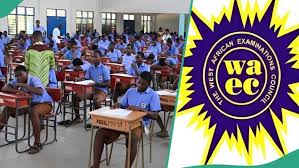National Alarm: 61% of Candidates Fail 2025 WASSCE as WAEC Withholds 192,000 Results Over Exam Fraud
National Alarm: 61% of Candidates Fail 2025 WASSCE as WAEC Withholds 192,000 Results Over Exam Fraud
A wave of shock, disappointment, and national concern has followed the release of the 2025 West African Senior School Certificate Examination (WASSCE) results, as over 1.2 million students failed to secure the minimum five credits, including English and Mathematics.
Out of 1,973,365 candidates, only 38.32% passed with the required credits to proceed to tertiary education—an alarming dip from last year’s 72.12% pass rate. The figures have raised red flags across the education sector, prompting calls for an urgent overhaul of Nigeria’s academic system.
Grim Statistics, Withheld Results, and Malpractice Concerns
WAEC’s Head of National Office, Dr. Amos Dangut, revealed that 192,089 results (9.75%) are being withheld due to widespread exam malpractice—ranging from the illegal use of mobile phones to coordinated cheating in some schools.
“Despite clear bans, the increasing use of mobile phones and organised misconduct remain serious issues. These are being thoroughly investigated,” Dangut said during a press briefing in Lagos.
Meanwhile, two unnamed states also had their results withheld due to non-payment of examination fees, affecting thousands more students who now find their academic futures uncertain.
Stakeholders: ‘We Are Failing the Next Generation’
Education stakeholders are reacting with deep frustration. Mr. Emmanuel Oji, President of the Association for Formidable Educational Development (AFED), described the results as a wake-up call for Nigeria.
“Less than 40% of our students passed. This should deeply worry us. It’s not just about the students—it’s about a failing system,” Oji warned.
He cited factors such as poor teaching methods, rote learning, lack of study materials, and insufficient skill-based education as drivers of the mass failure.
“If we don’t redirect our educational focus toward character, nationalism, and practical skills, we will continue this cycle of disappointment,” he added.
Proprietor of Royal Academy in Lagos, Mrs. Ronke Akintunde, said she was still in disbelief.
“I had to read the report multiple times. How can such a high number of candidates fail so badly? The government must ask tough questions.”
Parents Voice Anger, Demand Accountability
For many parents, the results were not just disappointing—they were devastating. A parent, Elder Sunday Nnamdi, called the situation “unacceptable”, blaming both WAEC and the education system.
“We were expecting better results than last year. Instead, 61% failed. What is going on in our schools? Who will be held accountable?”
Nnamdi urged WAEC and education authorities to explain the massive failure rate and suggested that systemic flaws are now impossible to ignore.
Female Candidates Outperformed Males
Interestingly, of the 754,545 students who passed, 53.99% were female, outshining their male counterparts who made up 46.01%.
WAEC also noted that 12,178 candidates with special needs participated in the exam. Their results have been released alongside other candidates, with appropriate accommodations made for their conditions—including impaired hearing and physical challenges.
What’s Next for Students?
Dr. Dangut confirmed that results are now available online via www.waecdirect.org. Students who have fulfilled all financial obligations to WAEC can check their scores and apply for digital certificates within 48 hours.
He emphasized that WAEC would not tolerate malpractice, stating:
“We must sanitize our examination process. Students, teachers, and schools involved in fraud are undermining our entire education system.”
Over 87,000 examiners participated in the script marking exercise held between July 3 and July 21, alongside over 2,700 digital examiners.
⚠️ The Big Picture: A National Education Crisis?
This year’s WASSCE result paints a troubling picture of deepening academic decline. With only a fraction of candidates meeting university admission requirements, and hundreds of thousands facing uncertain futures due to withheld results or poor performance, education advocates are calling for a national emergency response.
Unless deliberate reforms are initiated to prioritize quality teaching, curriculum relevance, and exam integrity, experts warn that Nigeria’s next generation may be caught in a worsening cycle of educational failure and social inequality.
By Haruna Yakubu Haruna

















